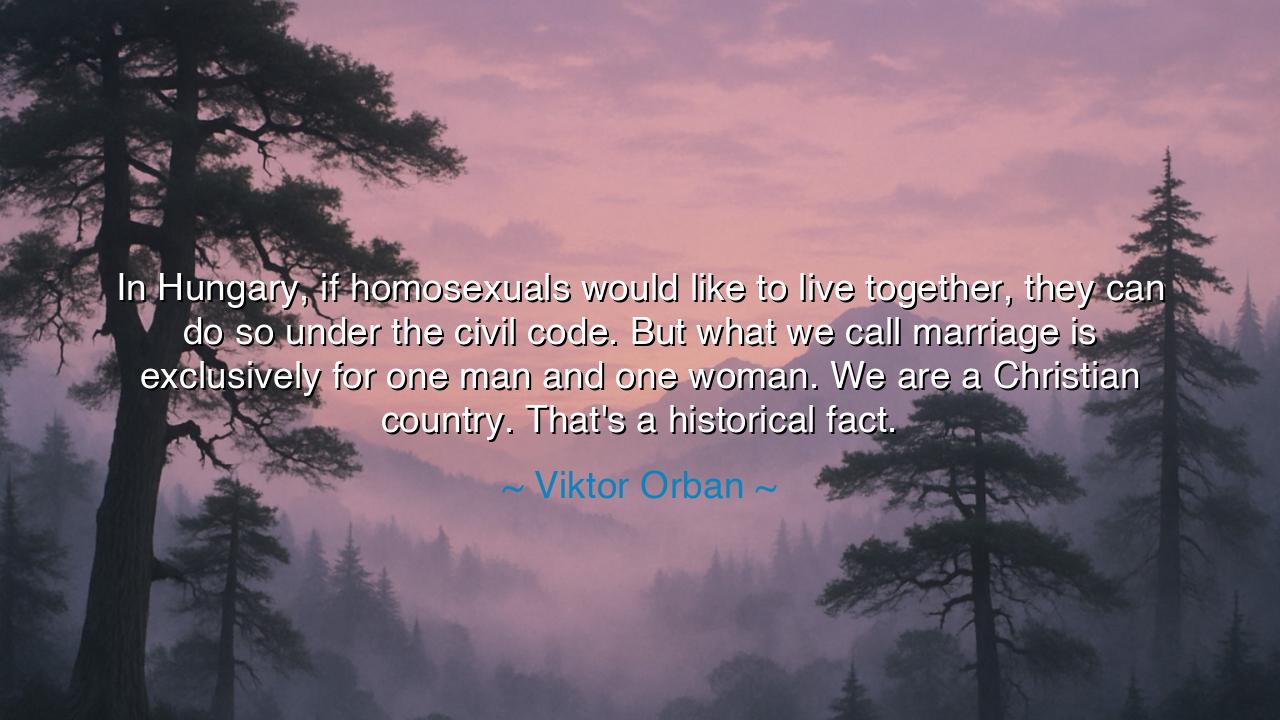
In Hungary, if homosexuals would like to live together, they can
In Hungary, if homosexuals would like to live together, they can do so under the civil code. But what we call marriage is exclusively for one man and one woman. We are a Christian country. That's a historical fact.






Viktor Orbán, leader of Hungary, once declared with resolute conviction: “In Hungary, if homosexuals would like to live together, they can do so under the civil code. But what we call marriage is exclusively for one man and one woman. We are a Christian country. That’s a historical fact.” These words, delivered not merely as opinion but as policy, reveal the deep and enduring tension between ancient tradition and modern calls for equality. In them, Orbán appeals to history and religion to define the boundaries of law, grounding marriage not in evolving social consensus but in what he sees as immutable cultural and spiritual heritage.
When he speaks of marriage as exclusively between “one man and one woman,” Orbán echoes a vision that has governed much of Europe for centuries, where religion and law were woven tightly together. In Christian teaching, marriage was sanctified as a sacred covenant meant for the union of man and woman, often tied to procreation and family stability. By appealing to Hungary’s Christian identity, Orbán invokes the memory of centuries in which the cross shaped not only private belief but public order. To him, to redefine marriage would not only alter a legal structure but unravel the very cultural fabric of the nation.
Yet, the mention of the civil code shows the modern compromise: that homosexuals may live together and be recognized under civil law, but without sharing the name or sacrament of marriage. This distinction between civil partnership and religiously defined marriage is not new—it echoes the ancient division between sacred and profane, between what belonged to the temple and what belonged to the marketplace. By permitting one and forbidding the other, Orbán attempts to honor the demands of modern rights without surrendering the identity he claims is “a historical fact.”
History offers us many mirrors for this struggle. Consider the reign of Constantine the Great, who in the 4th century declared Christianity the favored religion of the Roman Empire. In doing so, he reshaped Roman law, binding it to Christian morality. Customs that had once been tolerated—such as certain pagan marriages or looser family bonds—were now constrained under a Christian order. Orbán’s words reflect this same dynamic: the effort of a ruler to protect national identity by anchoring it in religious tradition, even as society changes around him.
But the winds of history are never still. Where Orbán sees permanence, others see transformation. Just as women once were excluded from the rights of citizenship and later gained them, just as interracial marriage was once forbidden and later affirmed, so too the definition of marriage has been contested and reshaped across centuries. What is defended as eternal often proves, over time, to be mutable. His words therefore embody not only conviction but also the universal human struggle between preserving tradition and embracing change.
The meaning of Orbán’s declaration is not only political but existential: it forces us to ask what defines a people, a culture, a nation. Is identity preserved only by holding fast to ancient customs, or can it endure while embracing new forms of justice? His insistence that Hungary is a Christian country raises this very question. For history, while it preserves the past, is not static; it is a river, ever flowing, sometimes carrying with it both the stones of tradition and the seeds of transformation.
The lesson for us, then, is to approach such debates with both clarity and humility. Recognize that tradition has power, shaping the hearts and identity of peoples for generations. But also recognize that tradition itself has always evolved, sometimes painfully, to include those once excluded. Do not dismiss history, but do not worship it either. Instead, weigh it against the eternal principles of justice, compassion, and human dignity.
Therefore, let us act with discernment. Honor the faith and heritage that shaped nations, but never forget that the measure of any society is how it treats its minorities. For Orbán’s words, whether one agrees or not, reveal a truth all must face: the struggle between history and justice is never finished. Each generation must choose how to walk the line between preserving its past and embracing the future. And if we choose wisely, we may yet find a way to honor both—upholding tradition while extending dignity to all.






AAdministratorAdministrator
Welcome, honored guests. Please leave a comment, we will respond soon